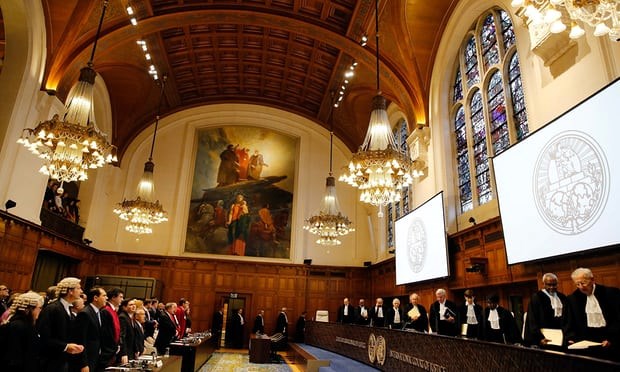
Friday November 10, 2017

A sitting of the international court of justice in The Hague.
Photograph: Bas Czerwinski/AFP/Getty Images
The UK’s candidate for the international court of justice (ICJ), Sir Christopher Greenwood, has been forced into a run-off election for the final remaining place on the court, in a humiliating blow to British diplomatic prestige at the United Nations. After five rounds of simultaneous voting in the security council and the general assembly in New York, four other judges from Brazil, Lebanon, France and Somalia were all elected to what is known as the “world court” in The Hague.
Greenwood, who has already served one nine-year term on the court, now faces an Indian candidate, Dalveer Bhandari, in a battle for the last place on the ICJ when voting resumes late on Monday. There will be a weekend of intense lobbying by diplomats at the UN to secure their candidate’s position.
There has always been a British judge on the court since it was established in 1946. It hears disputes over sovereignty and international borders from around the world. Losing a British presence on the court would be an international political embarrassment. During voting in the general assembly on Thursday evening, support for Greenwood progressively seeped away. In the first round he secured the support of 147 countries; by the fifth round he was down to only 76 votes, fewer than half of the states in the assembly.
The vote will be interpreted as a blow to the UK’s international standing post-Brexit and demonstrates the increasingly limited diplomatic influence wielded by the British foreign secretary, Boris Johnson, at the UN.
Greenwood, who is in his early 60s, was previously professor of international law at the London School of Economics. His most controversial public role was in the run-up to the invasion of Iraq. He was instructed by the then attorney general, Lord Goldsmith, to examine the arguments over the legality of using force against Saddam Hussein and concluded that the use of force was justified.
Advertisement
To be elected, any candidate must obtain a majority of 97 votes or more in the UN general assembly and also a majority of eight votes in the security council. Voting will continue until five candidates have obtained the required majorities.
Greenwood, who did win a narrow majority in the UN security council, may yet scrape through in Monday’s vote. His rival, Bhandari, secured 115 votes in the general assembly but failed to obtain a majority in the security council. At the time of his appointment in 2008, the then foreign secretary, David Miliband, described Greenwood as being “highly respected within the international legal community, and an outstanding academic and practitioner of international law”.
The other judges elected by the UN on Thursday evening were Ronny Abraham of France, Abdulqawi Ahmed Yusuf of Somalia, Antônio Augusto Cançado Trindade of Brazil and Nawaf Salam of Lebanon.
It is the second setback for the UK at the UN in recent months. In a separate vote at the UN general assembly last June the UK was defeated by 94 states to 15 when a Mauritian-backed resolution questioning the disputed legal status of the UK’s hold over the Chagos Islands in the Indian Ocean was referred to the ICJ.